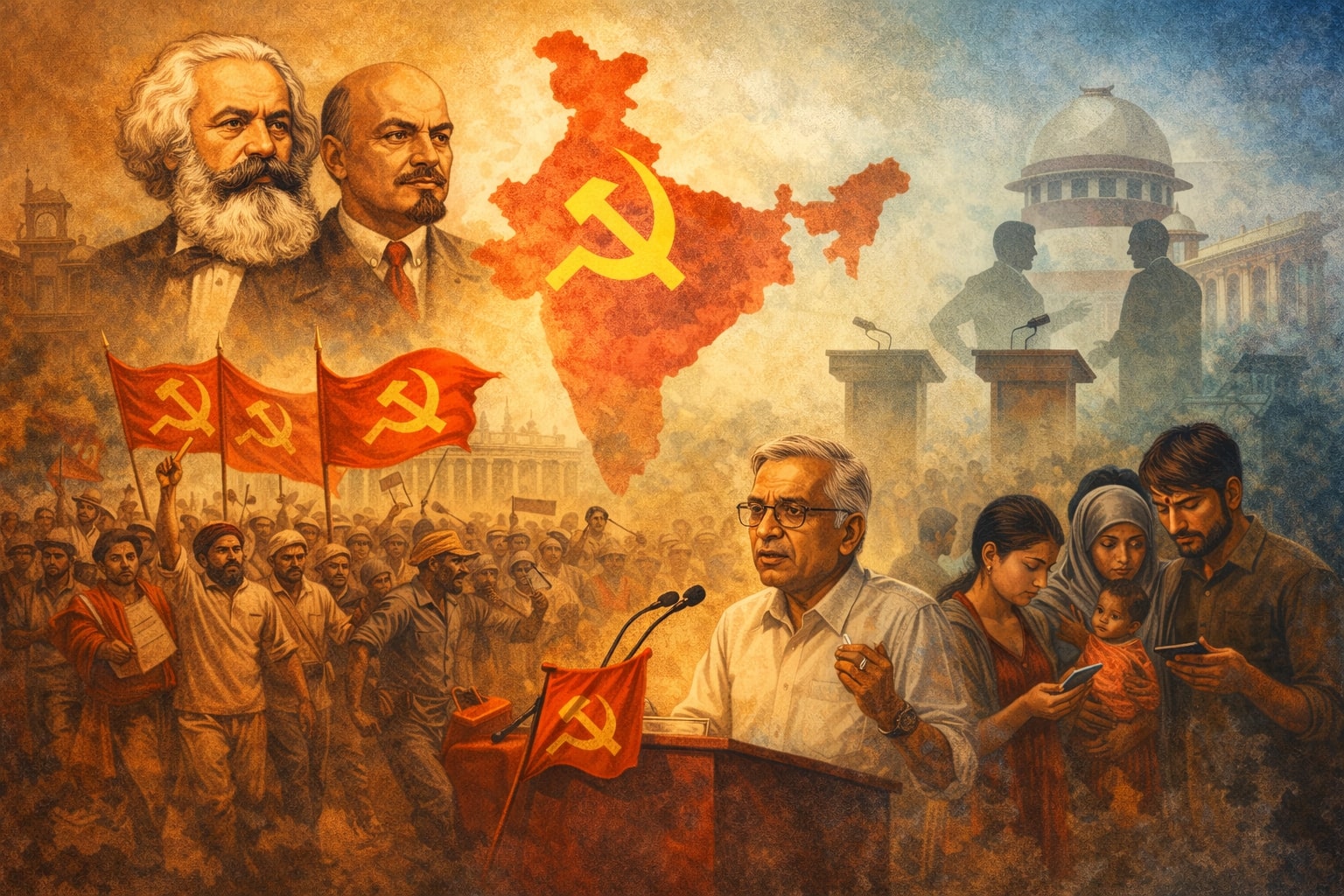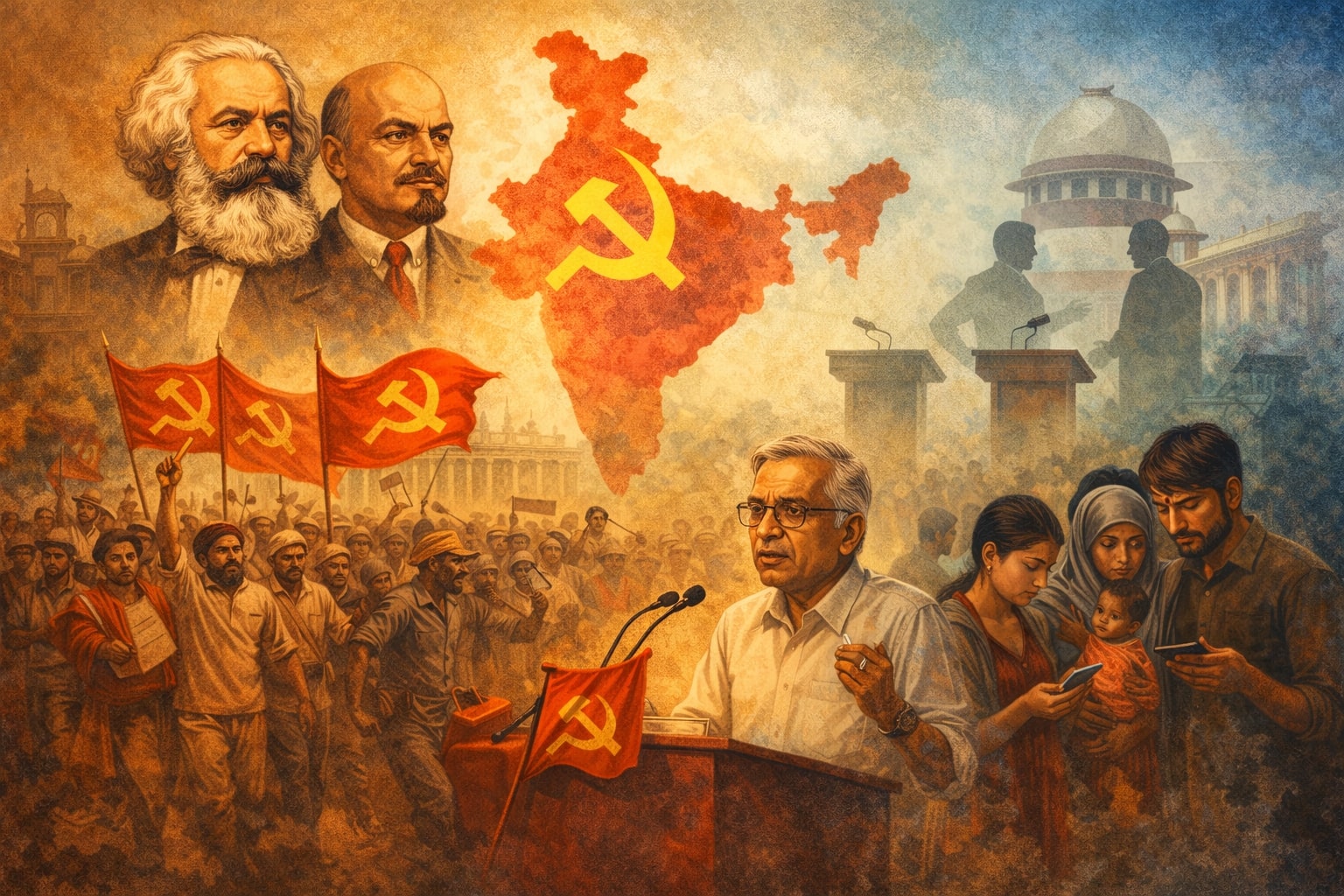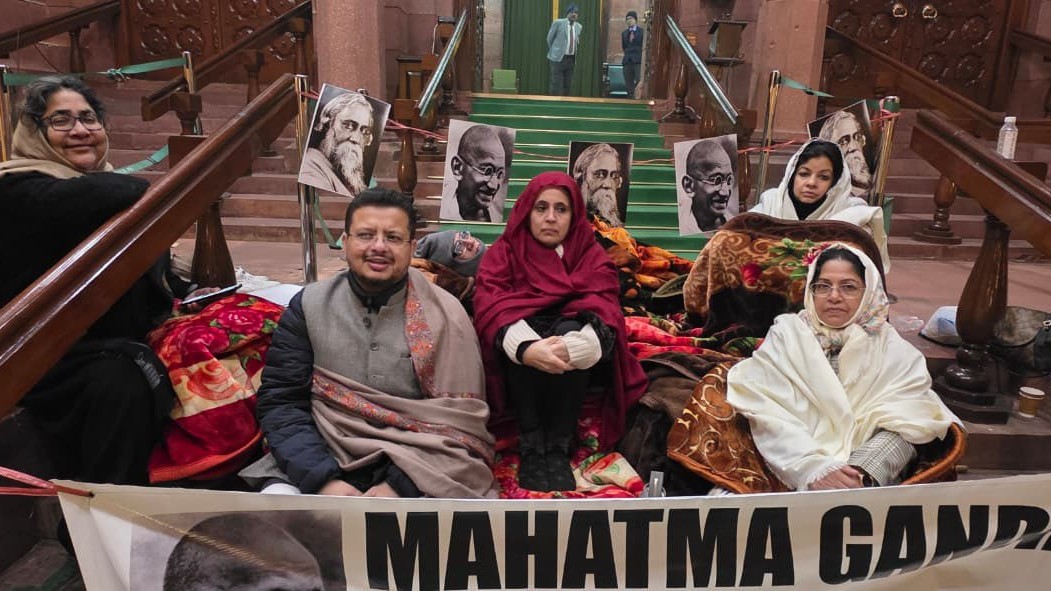The Mirage of Viksit Bharat

In an era where India’s economic narrative is dominated by the rhetoric of a $5 trillion economy and the vision of “Viksit Bharat by 2047,” the lived realities of its citizens—particularly government employees and pensioners—paint a starkly contrasting picture. While the wealth of billionaires multiplies at the rate of ₹2,000 per second, over 80 crore Indians remain dependent on the government’s free ration scheme of 5 kg grains per month. This paradox of prosperity and poverty underscores the widening chasm between capital accumulation and social welfare, a divide exacerbated by the current regime’s policy orientation under the leadership of the self-styled “Vishwaguru.”
The recent framing of pensioners as a “liability” by influential voices within the ruling establishment has sparked outrage among trade unions and civil society. This characterization not only undermines the decades of service rendered by public servants but also signals a shift toward fiscal conservatism that prioritizes capital over labor. The 8th Central Pay Commission, whose delayed constitution has already drawn sharp criticism, is emblematic of this shift. With terms of reference laced with phrases like “fiscal prudence” and “economic feasibility,” the commission appears more focused on budgetary containment than on addressing the erosion of real incomes caused by persistent inflation.
India’s Consumer Price Index (CPI) inflation hovered around 5.4% in October 2025, with food inflation breaching 7%, disproportionately impacting lower and middle-income households. Government employees, whose salaries have remained stagnant since the 7th Pay Commission, are witnessing a decline in purchasing power, further aggravated by rising fuel, housing, and healthcare costs. The Confederation of Indian Trade Unions (CITU) has warned that the government’s approach could dismantle the Old Pension Scheme, replacing it with market-linked instruments that expose retirees to financial volatility. This neoliberal pivot, critics argue, is designed to ease regulatory burdens on corporates while eroding the social safety net for workers.
The irony is palpable: while India celebrates technological imports like ChatGPT and Copilot—products of foreign innovation—it neglects the very scientists and bureaucrats who enabled indigenous marvels like the ₹7/km Mangalyaan mission. Infrastructure projects worth billions collapse before inauguration, yet the government continues to announce schemes with little regard for implementation efficacy. The debate over employee welfare has been sidelined, drowned out by grandiose visions of geopolitical dominance and economic expansion. Plans to rival China and America in strategic domains are underway, but the foundational pillars of governance—public service, institutional integrity, and social justice—remain precariously ignored.
This moment demands introspection. The craftsmanship of policy must not be reduced to optics and slogans; it must reflect the aspirations of those who have devoted their lives to the nation. The neglect of employee rights, the dilution of pension entitlements, and the commodification of public service are not just economic missteps—they are political choices with profound implications. As India marches toward 2047, the question is not merely whether it will become a developed nation, but whether it will remain a just one.
The 8th Pay Commission’s Reckoning
India’s central trade unions—AITUC, INTUC, CITU, and HMS—have mounted a coordinated and data-driven challenge to the Union Government’s approach to the 8th Central Pay Commission, alleging that its restrictive Terms of Reference (ToR) are designed to impose austerity at the expense of employee rights and social security. These unions argue that the commission’s delayed constitution, vague mandate, and election-linked timing reflect a political calculus rather than a commitment to economic justice.
The All India Trade Union Congress (AITUC), led by Amarjeet Kaur, has accused the government of excluding nearly 69 lakh pensioners and family pensioners from the commission’s scope, calling the move “anti-worker” and “anti-pensioner”. The Indian National Trade Union Congress (INTUC) has demanded that the commission ensure retrospective implementation from January 1, 2026, and include automatic DA neutralization, arguing that inflation has already eroded real incomes by over 45% since 2016. The Centre of Indian Trade Unions (CITU), through General Secretary Tapan Sen, has warned that the ToR raises “serious doubts” about the government’s intent, suggesting it aims to further neoliberal reforms that dismantle the Old Pension Scheme (OPS).
Historically, pay commissions have served as inflation-corrective mechanisms. The 7th Pay Commission in 2016 recommended a fitment factor of 2.57, raising the minimum basic pay from ₹7,000 to ₹18,000. However, with cumulative inflation breaching 45% and food inflation crossing 7% in October 2025, the proposed fitment factor of 3.68 to 3.85 under the 8th Pay Commission—raising minimum pay to ₹26,000–₹27,000—is seen as insufficient, especially with implementation delayed until late 2027 or early 2028.
The social implications are profound. Over 80 crore Indians still rely on the free ration scheme, and government employees—once the backbone of India’s administrative and scientific achievements—now face shrinking purchasing power, rising healthcare costs, and housing unaffordability. Pensioners who contributed to landmark missions like Mangalyaan are being recast as fiscal burdens, while billionaires accumulate wealth at rates exceeding ₹2,000 per second.
Unions are demanding structural safeguards: restoration of OPS, transparent implementation timelines, and inclusive coverage for all pensioners. Their objections are not merely ideological—they are rooted in legal precedent, economic data, and historical calculations. In a nation aspiring to rival China and America by 2047, the survival of its public servants must not be contingent on austerity. The real test of Viksit Bharat lies in whether it honors those who built its foundations.
CITU’s Call for Urgent Redress
The Centre of Indian Trade Unions (CITU) has strongly condemned the Terms of Reference (ToR) of the 8th Central Pay Commission (CPC), alleging that they are crafted to impose austerity and dismantle hard-won employee entitlements. The Modi-led government, it argues, delayed the appointment of the commission’s chairperson and part-time member by nearly a year—timed conveniently around electoral cycles in Delhi and Bihar—thereby pushing any potential benefit of the CPC recommendations to 2027 or beyond.
CITU asserts that the inclusion of ambiguous and ideologically loaded phrases such as “unfunded non-contributory old pension,” “fiscal prudence,” and “economic feasibility” in the ToR signals a deeper neoliberal agenda. These terms, under the current policy regime, are seen as tools to suppress upward revision of pay, perks, and pensions. The backdrop of the Validation Act, passed as part of the Finance Bill 2025, further compounds fears of a systemic erosion of pension rights, especially for those under the Old Pension Scheme (OPS).
The union contrasts this austerity with the government’s generous corporate giveaways—lakhs of crores through PLI, ELI, tax cuts, and loan waivers—arguing that fiscal discipline is selectively applied to the working class. CITU warns that the ToR may be used to overhaul the pension regime entirely, undermining both current and future pensioners, and coercively pushing employees from NPS to the controversial Unified Pension Scheme (UPS).
As a remedy, CITU demands immediate amendment of the ToR to guarantee unconditional upward revision of wages and benefits for all employees and pensioners, with universal restoration of OPS. It calls for the repeal of the Validation Act provisions affecting pensions and reaffirms its solidarity with the ongoing struggles of central and state government employees against austerity.
Amarjeet Kaur’s Call for Resistance Against Corporate-Centric Governance
Amarjeet Kaur, General Secretary of AITUC, has delivered a scathing critique of the Union Government’s approach to governance, alleging a systematic erosion of democratic values and institutional autonomy. According to her, the government has not only captured the operational independence of autonomous bodies—once protected under constitutional and statutory frameworks—but has also weaponized these institutions to serve partisan and corporate interests. This, she argues, reflects a deeper ideological shift where the state increasingly aligns with corporate lobbies, sidelining the very public servants and citizens who have historically built and sustained the nation.
Kaur emphasizes that the backbone of India is not its billionaires or boardrooms, but its people—scientists, teachers, bureaucrats, and workers—who have delivered on national missions from space exploration to public health. Yet, these very contributors now face a regime that has turned hostile, particularly toward government employees. The deliberate delay in pay revisions, the dismantling of pension protections, and the invocation of terms like “fiscal prudence” and “economic feasibility” are, in her view, rhetorical tools to justify austerity while shielding corporate profiteering.
In this context, Kaur asserts that parliamentary mechanisms have been hollowed out, and that meaningful redress can only emerge through mass mobilization. “In a democracy where the legislature no longer listens,” she argues, “the streets must speak.” The struggle, she insists, is not just for wages or pensions, but for the moral and democratic fabric of the nation. The government’s attempt to demoralize public servants and coerce them into silence must be met with organized resistance. For Kaur and the broader trade union movement, public struggle is not just a tactic—it is the last remaining instrument to safeguard rights, restore institutional integrity, and reclaim the democratic ethos.
Delayed Implementation of the 8th CPC: Prof. Saket Kusawaha, Vice – Chancellor, University of Ladhakh
The 8th Central Pay Commission (CPC), expected to submit its report by late 2027, has already raised concerns due to the government’s reluctance to announce a definitive implementation date. If the rollout is deferred to late 2028 or early 2029, the implications for employees will be both economically regressive and politically calculated. By 2029, assuming the current Dearness Allowance (DA) trajectory continues—averaging 4% every six months—the DA would exceed 100%, effectively doubling the current basic pay. For instance, a basic salary of ₹18,000 with 100% DA yields ₹36,000. If the CPC applies a fitment factor of 1.86, the revised basic would be ₹33,480—less than the inflation-adjusted current pay. This results in a net loss, undermining the very rationale of a pay commission, which is meant to enhance real income, not suppress it.
The historical comparison makes the delay even more glaring. The 7th CPC was due from 1 January 2016 but was implemented only in July 2016, a delay of about six months. In contrast, the 8th CPC, if implemented in January 2029 instead of January 2026 or even early 2028, would represent a delay of 24–36 months. This is four to six times longer than the previous delay, setting a troubling precedent. Such a prolonged deferment suggests not administrative necessity but political timing. A 2029 implementation would align neatly with the general elections, allowing the government to showcase a “generous” pay revision while concealing the fact that employees had already absorbed inflation through DA. This transforms a statutory entitlement into a political bargaining chip.
The economic consequence is stark: employees would have endured nearly four years of stagnation, only to receive a revision that fails to match inflation. The erosion of trust among public servants is inevitable. Moreover, the ripple effect is significant. Each government employee supports not just their household but also provides privileged support and nourishment to at least 10–15 people in their extended family and community. If one employee suffers, the hardship multiplies across dozens of dependents. When millions of employees and their extended circles feel the pinch, the electoral consequences could be severe. What may appear as fiscal prudence and political strategy could easily backfire, as disillusioned employees and their families form a substantial voting bloc.
Unless the fitment factor is revised upward (e.g., 2.57 or higher) and implementation is timely, the 8th CPC risks becoming a ceremonial exercise. The government must choose between genuine economic justice and short-term political optics. Anything less would be a betrayal of the workforce that sustains the nation’s administrative and developmental machinery. The lesson from history is clear: while the 7th CPC delay of six months was tolerated, a delay of 24–36 months under the 8th CPC will not be forgotten. The government must pay heed—because the very workforce it seeks to placate during elections may instead turn against it if promises are deferred beyond reason.

 3 months, 3 weeks ago
3 months, 3 weeks ago











[[comment.comment_text]]